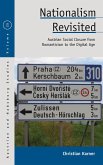In an age where history is a global battleground and fake news proliferates, culture wars are being waged across India over its future - majoritarian or inclusive, neoliberal or socialist, religious or secular?
Fake Gods and False History takes us to the BDD Chawls, a central Mumbai neighbourhood of tenement blocks (chawls) on the brink of a controversial redevelopment. It reveals how contested narratives of Indian history play out in the daily life of this divided neighbourhood and how the legacies of certain godlike but very human historical figures, such as Dr Babasaheb Ambedkar and Chhatrapati Shivaji, are invoked by different communities. Jonathan Galton draws on research conducted among the formerly untouchable Dalit Buddhist community, who are staunchly opposed to the redevelopment plans and deeply critical of the religious nationalism they perceive in their Hindu neighbours. We also meet young male migrants living in village-linked dormitory rooms called Gramastha Mandals, trapped in a liminal space between urban and rural.
Throughout the book, which is woven through with candid reflections on methodology and research ethics, readers are challenged into drawing connections with their own experiences of history impinging on their lives. A story that might initially seem parochial will thus resonate with a diverse global audience.
Praise for Fake Gods and False History
'With the skill of an exceptional ethnographer, Galton vividly brings to life the dynamics of an entire country in the everyday life of a tenement block. Familiar clear-cut narratives on migration, politics and caste are called into question, resulting in a remarkable story that makes this book a treasure.'
David Mosse, School of Oriental and African Studies
'With his empathetic, wry examination of contested pasts and anxious presents as they play out in Delisle Road's BDD Chawls, Galton allows us to imagine the contours of Mumbai's - and India's - uncertain futures. Fake Gods and False History is painstaking academic research disguised as an engaging collection of city stories.'
Naresh Fernandes, Founder and Editor, Scroll.in
Fake Gods and False History takes us to the BDD Chawls, a central Mumbai neighbourhood of tenement blocks (chawls) on the brink of a controversial redevelopment. It reveals how contested narratives of Indian history play out in the daily life of this divided neighbourhood and how the legacies of certain godlike but very human historical figures, such as Dr Babasaheb Ambedkar and Chhatrapati Shivaji, are invoked by different communities. Jonathan Galton draws on research conducted among the formerly untouchable Dalit Buddhist community, who are staunchly opposed to the redevelopment plans and deeply critical of the religious nationalism they perceive in their Hindu neighbours. We also meet young male migrants living in village-linked dormitory rooms called Gramastha Mandals, trapped in a liminal space between urban and rural.
Throughout the book, which is woven through with candid reflections on methodology and research ethics, readers are challenged into drawing connections with their own experiences of history impinging on their lives. A story that might initially seem parochial will thus resonate with a diverse global audience.
Praise for Fake Gods and False History
'With the skill of an exceptional ethnographer, Galton vividly brings to life the dynamics of an entire country in the everyday life of a tenement block. Familiar clear-cut narratives on migration, politics and caste are called into question, resulting in a remarkable story that makes this book a treasure.'
David Mosse, School of Oriental and African Studies
'With his empathetic, wry examination of contested pasts and anxious presents as they play out in Delisle Road's BDD Chawls, Galton allows us to imagine the contours of Mumbai's - and India's - uncertain futures. Fake Gods and False History is painstaking academic research disguised as an engaging collection of city stories.'
Naresh Fernandes, Founder and Editor, Scroll.in
Dieser Download kann aus rechtlichen Gründen nur mit Rechnungsadresse in A, D ausgeliefert werden.









